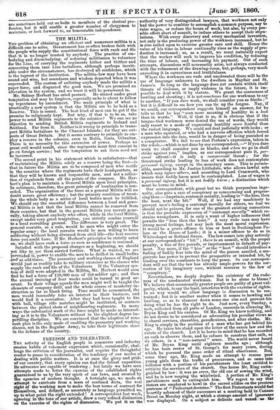THE MILITIA.
Tau problem of obtaining an efficient and numerous militia is a difficult one to solve. Government has so often broken faith with the people who supply the constitutional force with rank and file that it is no longer trusted by anybody. The practice of em- bodying and disembodying, of seducing militiamen to volunteer for the Line, of carrying the regiments hither and thither and converting them into Line battalions, although perhaps inevit- able under the circumstances, has destroyed all confidence, which is the taproot of the institution. The militia-law may have been sound and wise, but soundness and wisdom departed when it was superseded. The custom of enlisting anybody made the militia a paper force, and disgusted the good men. We are promised an alteration in the system, and we trust it will be persevered in. Mr. Sidney Herbert has cried peocavi. He sinned under great temptation and may be forgiven, especially as he is about to follow up repentance by amendment. The main principle of what is practically a new system is that the Militia are to be held as a Reserve. This is sound. The best kind of men can be got if the promise be religiously kept. But why, if that is to be so, take power to send Militia regiments to the colonies ? We can see no objection to sending British Militia regiments to Ireland and Scotland. Far from it. Neither is it wrong in principle to trans- port Militia battalions to the- Channel Islands; for they are out- posts of Great Britain. But it seems contrary to principle to em- ploy a reserve in the colonies, even in Malta, Ionia, Gibraltar. There is no necessity for this extension of power. Perhaps no great evil would result, since the regiments must first consent to go en foreign service; but the temptation to ask them need not be incurred.
The second point in his statement which is satisfactory—that of maintaining the Militia solely as a reserve being the first—is that in future the Militia are to be composed of men who reside in the counties where the regiments have their headquarters, so that they will be known and responsible men, and not a collec- tion of vagabonds from all the points of the compass. Mr. Her- bert's plan is to maintain a General Militia upon local principles. In substance, therefore, the great principle of localization is con- ceded. The organization of the force as a general Militia will no doubt secure great efficiency ; but the primary condition of treat- ing the whole body as a series of local bodies must be fulfilled. We should say the essential difference between a local and gene- ral Militia is not that the local Militia cannot be removed from their counties, but that in the general Militia you recruit gene- rally, taking almost anybody who offers, while in the local Militia, except under very great temptation, you strictly confine yourself to a local recruiting ground. The difference is very great. The general recruits, as a rale, would be men who might enter the regular army ; the local recruits would be men willing to learn soldiering without being divorced from civil life—the best reserve force you could have. If Mr. Herbert's principles be strictly acted on, we shall have such a force as soon as confidence is restored.
Satisfied with the proposed changes as a beginning, we should yet like to see them carried further. What is wanted, we are persttded is, power to enable the men to be drilled in small bodies -siirsrat odd times. The peasantry and working classes of England would just as readily take to military exercises as the classes who supply the rank and file of the'Volunteers. If the Volunteer sys- tem of drill were adopted in the Militia, Mr. Herbert would soon find he had a force of 120,000 men of thb-aoldier age ; and then the annual training of four weeks could beturned to good ac- count. In their village squads the men might well be taught the elements of company drill, and the whole course of musketry in- struction as far as blank firing. Time would be economized, the men would insensibly take an interest in their business, and would find it a recreation. After they had been taught to fire with ball, village rifle matches might be instituted, or contests between the picked shots of neighbouring regiments. In many ways the substantial work of the force might be made as interest- ing as it is to the Volunteers without in the slightest degree im- perilling discipline. We are convinced that the adoption of some such plan is the only mode of enabling the peasantry and working classes, not in the Regular Army, to take their legitimate share in the defence of the country.


























 Previous page
Previous page